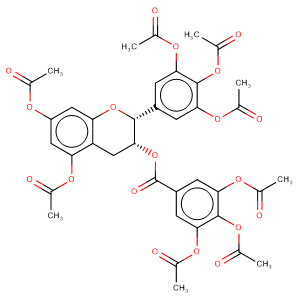
EGCG Octaacetate
CAS No. 148707-39-5
EGCG Octaacetate( —— )
Catalog No. M21485 CAS No. 148707-39-5
EGCG Octaacetate a prodrug of EGCG is utilized to enhance the stability and bioavailability of EGCG in vivo. It has high efficacy bioavailability anti-oxidation and anti-angiogenesis capacities.
Purity : >98% (HPLC)
 COA
COA
 Datasheet
Datasheet
 HNMR
HNMR
 HPLC
HPLC
 MSDS
MSDS
 Handing Instructions
Handing Instructions
| Size | Price / USD | Stock | Quantity |
| 5MG | 72 | In Stock |


|
| 100MG | Get Quote | In Stock |


|
| 200MG | Get Quote | In Stock |


|
| 500MG | Get Quote | In Stock |


|
| 1G | Get Quote | In Stock |


|
Biological Information
-
Product NameEGCG Octaacetate
-
NoteResearch use only, not for human use.
-
Brief DescriptionEGCG Octaacetate a prodrug of EGCG is utilized to enhance the stability and bioavailability of EGCG in vivo. It has high efficacy bioavailability anti-oxidation and anti-angiogenesis capacities.
-
DescriptionEGCG Octaacetate a prodrug of EGCG is utilized to enhance the stability and bioavailability of EGCG in vivo. It has high efficacy bioavailability anti-oxidation and anti-angiogenesis capacities.
-
In Vitro——
-
In Vivo——
-
Synonyms——
-
PathwayOthers
-
TargetOther Targets
-
RecptorOthers
-
Research Area——
-
Indication——
Chemical Information
-
CAS Number148707-39-5
-
Formula Weight794.67
-
Molecular FormulaC38H34O19
-
Purity>98% (HPLC)
-
SolubilityIn Vitro:?DMSO : 100 mg/mL (125.84 mM)
-
SMILESCC(Oc1cc(O[C@@H]([C@@H](C2)OC(c(cc3OC(C)=O)cc(OC(C)=O)c3OC(C)=O)=O)c(cc3OC(C)=O)cc(OC(C)=O)c3OC(C)=O)c2c(OC(C)=O)c1)=O
-
Chemical Name——
Shipping & Storage Information
-
Storage(-20℃)
-
ShippingWith Ice Pack
-
Stability≥ 2 years
Reference
1.Wang CC et al. Prodrug of green tea epigallocatechin-3-gallate (Pro-EGCG) as a potent anti-angiogenesis agent for endometriosis in mice. Angiogenesis. 2013 Jan;16(1):59-69.
molnova catalog



related products
-
Butylboronicacid
Butylboronicacid is a competitive inhibitor of urease and acts as a monosaccharide complexing reagent.
-
AChE-IN-23
AChE-IN-23 (compound 3h) is an acetylcholinesterase (AChE) inhibitor with an IC50 value of 48.3 μM .
-
Ulinastatin
Ulinastatin is a multivalent Kunitz-type serine protease inhibitor with anti-inflammatory properties.



 Cart
Cart
 sales@molnova.com
sales@molnova.com


